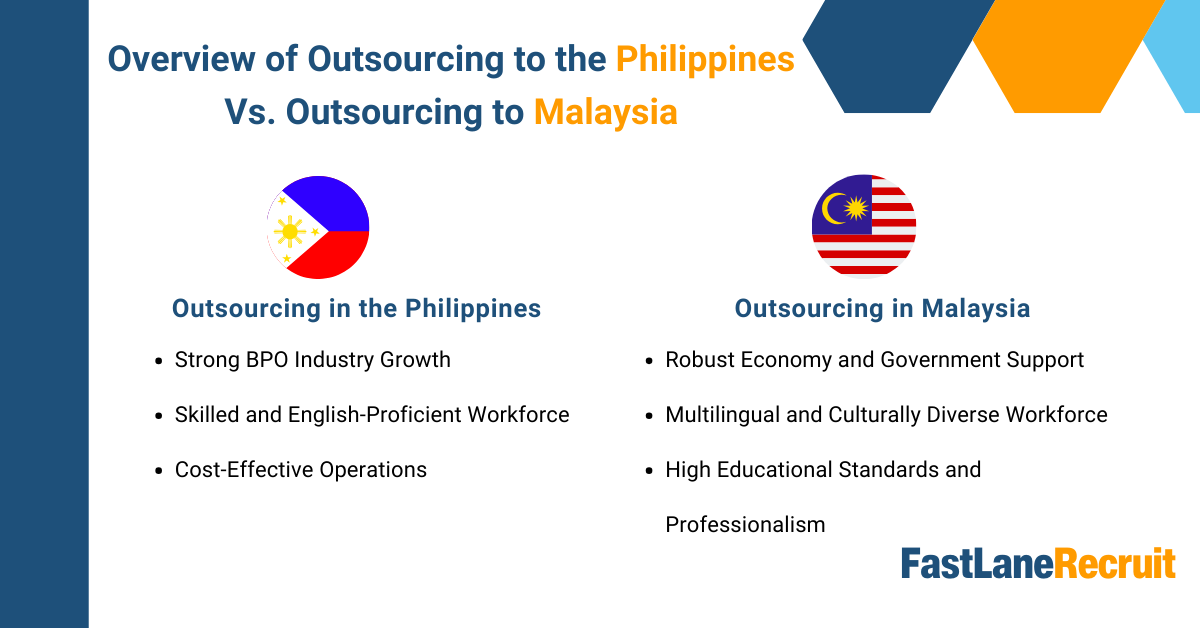In today’s competitive global economy, businesses are increasingly looking towards Southeast Asia for outsourcing solutions. The Philippines and Malaysia stand out as two of the region’s largest outsourcing destinations, each offering unique advantages.
In this blog, we’ll explore the key differences between outsourcing in the Philippines and Malaysia, focusing on factors such as economic stability, government incentives, cultural adaptability, education, and cost-effectiveness. By the end, you’ll have a clearer understanding of which destination aligns best with your business needs.
Content Outline
Key Summary
Philippines
A global leader in voice-based outsourcing, offering cost-effective solutions, a highly skilled English-speaking workforce, and strong government incentives. Ideal for customer service, back-office operations, and IT support.
Malaysia
Known for its multilingual workforce, technical expertise, and government-backed initiatives like the Multimedia Super Corridor (MSC). Perfect for specialized roles in software development, data analytics, and fintech.
Salary Comparison
The Philippines offers lower salaries, making it budget-friendly for customer support roles, while Malaysia’s higher wages reflect its technical and multilingual capabilities.
Cultural Compatibility
The Philippines excels in Westernized customer service, while Malaysia’s multicultural workforce caters to diverse markets.
Future Outlook
Malaysia is emerging as a hub for innovation and high-value outsourcing, supported by strong infrastructure and government policies.
Decision Factors
Choose the Philippines for cost-effective, customer-centric services, and Malaysia for technical expertise and multilingual capabilities.
Overview of Outsourcing in the Philippines
Strong BPO Industry Growth
The Philippines has established itself as a powerhouse in the global Business Process Outsourcing (BPO) industry. With an impressive annual growth rate of 46% since 2006, the country ranks as the second top IT-BPO destination in the Asia-Pacific region. Major cities like Quezon City, Cebu, and Davao are recognized among the “Top Ten Asian Cities of the Future” for their robust outsourcing ecosystems.
Read more What is Outsourcing?
Skilled and English-Proficient Workforce
One of the Philippines’ most notable advantages is its large pool of English-speaking professionals. The country’s workforce is renowned for its exceptional communication skills, customer service orientation, and cultural affinity with Western markets, making it a preferred choice for voice-based outsourcing services.
Cost-Effective Operations
The low operational costs in the Philippines are another major draw. With competitive salaries, affordable office spaces, and government-issued tax incentives, the country presents an ideal environment for foreign multinationals and startups.
Also Read Is Outsourcing Philippines Right for You
Overview of Outsourcing in Malaysia
Robust Economy and Government Support
Malaysia offers a stable and resilient economy that has weathered global economic challenges effectively. The country’s inflation rate remains low, creating a favorable business environment. Strong government initiatives, such as the Multimedia Super Corridor (MSC) Malaysia, provide substantial support for IT-BPO companies through tax breaks, grants, and infrastructure development.
Multilingual and Culturally Diverse Workforce
A standout feature of Malaysia’s outsourcing industry is its multicultural, multilingual workforce. Proficiency in English, Mandarin, Malay, Tamil and other languages makes Malaysia an attractive option for companies with diverse client bases across Asia and beyond.
High Educational Standards and Professionalism
Compared to the Philippines, Malaysia boasts a more developed educational system, producing a workforce with strong technical expertise and professionalism. This advantage makes Malaysia particularly appealing for high-value outsourcing tasks, such as IT services, software development, and financial analysis.

Salary Comparison: Philippines vs. Malaysia
When it comes to labor costs, the Philippines tends to have a lower salary range compared to Malaysia, making it a more budget-friendly outsourcing destination for voice-based services and customer support roles. However, Malaysia’s slightly higher salaries are offset by its multilingual capabilities and higher productivity for specialized tasks.
Also Read Malaysia Salary Guide 2025
| Job Role | Average Monthly Salary (Philippines) | Average Monthly Salary (Malaysia) |
| Customer Service Agent | $500 – $700 | $800 – $1,000 |
| IT Support Specialist | $700 – $1,000 | $1,200 – $1,500 |
| Software Developer | $1,000 – $1,500 | $1,500 – $2,500 |
| Digital Marketing Analyst | $600 – $900 | $1,000 – $1,400 |
| Data Entry Specialist | $400 – $600 | $700 – $1,000 |
| Financial Analyst | $900 – $1,200 | $1,500 – $2,000 |
Key Differences and Considerations
Language and Cultural Compatibility
The Philippines is renowned for its English proficiency and Westernized culture, making it an excellent choice for businesses targeting English-speaking markets. Filipinos are naturally hospitable and empathetic, which enhances customer interactions.
In contrast, Malaysia’s multilingual workforce offers a unique advantage for businesses operating in diverse markets. The ability to communicate in languages like Mandarin, Malay, and Tamil allows Malaysian outsourcing teams to cater to a broader range of clients.
Industry Specialization
The Philippines has carved a niche in voice-based services, such as customer support and telemarketing, thanks to its strong English-speaking workforce. It also excels in back-office operations, healthcare outsourcing, and IT services.
Malaysia, on the other hand, is gaining recognition for its expertise in technical fields like software development, data analytics, and fintech. The country’s focus on innovation and technology makes it a preferred destination for businesses requiring specialized skills.
Economic and Political Stability
The Philippines has demonstrated remarkable economic stability, with its BPO sector expected to grow by 30-40% in the coming years. However, political uncertainties can sometimes pose challenges for businesses.
Malaysia’s economy, while recovering from the 2009 global recession, benefits from strong government support and proactive policies. The country’s political landscape is relatively stable, providing a secure environment for long-term investments.
Workforce Skills and Professionalism
Both countries boast skilled workforces, but there are notable differences. The Philippines excels in customer service and English proficiency, making it ideal for roles that require strong communication skills.
Malaysia’s workforce, on the other hand, is known for its technical expertise and professionalism. The country’s emphasis on education and training ensures that outsourcing professionals are well-prepared to handle complex tasks and deliver high-quality results.
Potential Drawbacks of Each Country
Potential Drawbacks of Outsourcing to the Philippines
- Infrastructure Challenges
While major cities like Manila and Cebu have well-developed infrastructure, some areas still experience inconsistent internet connectivity and power outages. These issues can affect business operations, especially for IT-intensive services. - Vulnerability to Natural Disasters
Philippines is prone to typhoons, earthquakes, and flooding, which can disrupt business continuity. Companies outsourcing to the country must have contingency plans in place to minimize operational disruptions. - Rising Costs in Prime Locations
The cost advantage of outsourcing to the Philippines is gradually decreasing in major cities due to increasing demand. Salaries and office rental prices are rising, making it less cost-effective than it once was. - Time Zone Differences for Non-Western Markets
While the Philippines aligns well with Western time zones, businesses targeting Asian or European markets may face operational challenges due to time differences. - Competition for Skilled Talent
The growing outsourcing industry has led to high employee turnover rates, particularly in the BPO sector. Companies may need to invest more in employee retention strategies to maintain a stable workforce.
Potential Drawbacks of Outsourcing to Malaysia
- Higher Labor Costs Compared to the Philippines
While Malaysia offers a skilled and multilingual workforce, labor costs are higher than in the Philippines. Businesses looking for budget-friendly outsourcing solutions may find Malaysia less cost-effective. - Strict Employment and Business Regulations
Malaysia has more complex labor laws and business regulations compared to the Philippines. Compliance with work permits, employee benefits, and local hiring policies can be time-consuming for foreign companies. - Limited Availability of Voice-Based BPO Talent
While Malaysia excels in technical and specialized outsourcing services, it is not as dominant as the Philippines in voice-based customer support. Companies looking for large-scale call center operations may find fewer options in Malaysia. - Economic Dependency on Specific Industries
Malaysia’s economy is heavily reliant on key industries such as oil & gas, electronics, and finance. Any downturn in these sectors could indirectly impact outsourcing operations. - Language and Cultural Adaptability for Western Markets
Although Malaysia is a multilingual country, its workforce is more accustomed to serving Asian markets. Businesses catering to Western customers may require additional training to align with cultural expectations.
Both the Philippines and Malaysia have strong outsourcing potential, but businesses must weigh these drawbacks against their specific needs and priorities when making a decision.
The Future of Outsourcing in Malaysia
Emerging Market Opportunities
Malaysia’s outsourcing industry is poised for significant growth, driven by government support and a focus on innovation. The country is increasingly attracting IT-BPO companies, particularly in areas like software development, data analytics, and fintech.
Infrastructure and Technological Advancements
Malaysia’s investment in infrastructure and technology ensures that businesses have access to state-of-the-art facilities and reliable connectivity. This makes it an attractive option for companies looking to scale their operations. For accounting outsourcing, Malaysia’s compliance with international financial reporting standards (IFRS) and its familiarity with cloud accounting platforms like Xero and QuickBooks make it an ideal destination for businesses seeking efficient and accurate financial management services.
Conclusion: Which Destination is Right for Your Business?
Both the Philippines and Malaysia offer compelling advantages for businesses looking to outsource. The Philippines is ideal for companies seeking cost-effective solutions with a strong emphasis on customer service, while Malaysia stands out for its technical expertise, multilingual workforce, and government-backed initiatives.
Ultimately, the choice depends on your business goals, budget, and the specific services you require. If you’re leaning toward Malaysia, FastLaneRecruit can help you navigate the outsourcing landscape with ease.
Outsource with Confidence in Malaysia
Ready to explore the benefits of outsourcing in Malaysia? At FastLaneRecruit, we specialize in connecting businesses with top-tier outsourcing talent in Malaysia. Our expertise in local market dynamics, government incentives, and recruitment strategies ensures that your outsourcing operations are seamless and cost-efficient. Let us help you tap into Malaysia’s multilingual, professional workforce and elevate your business to new heights.
Get in touch with FastLaneRecruit today and unlock the full potential of outsourcing in Malaysia!


